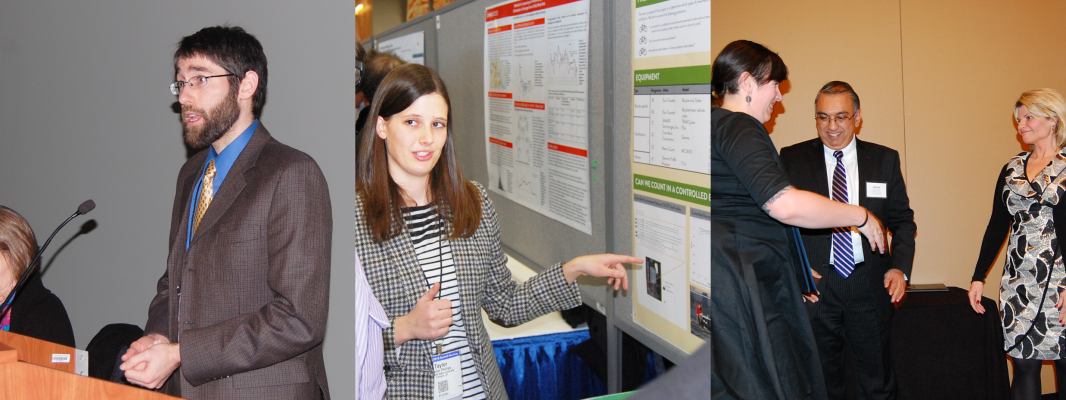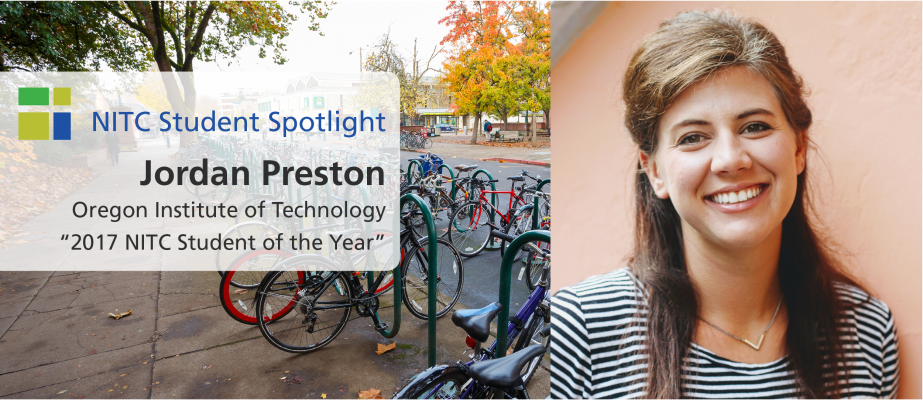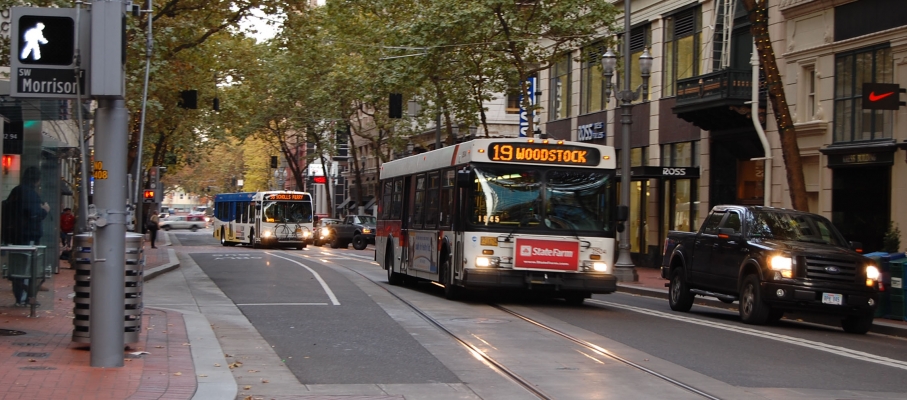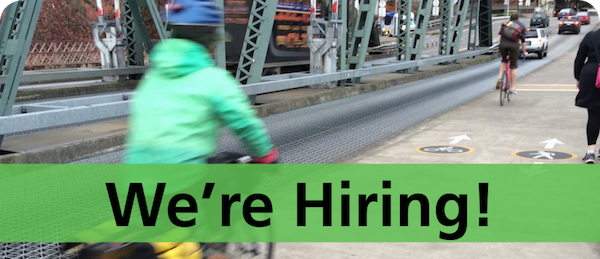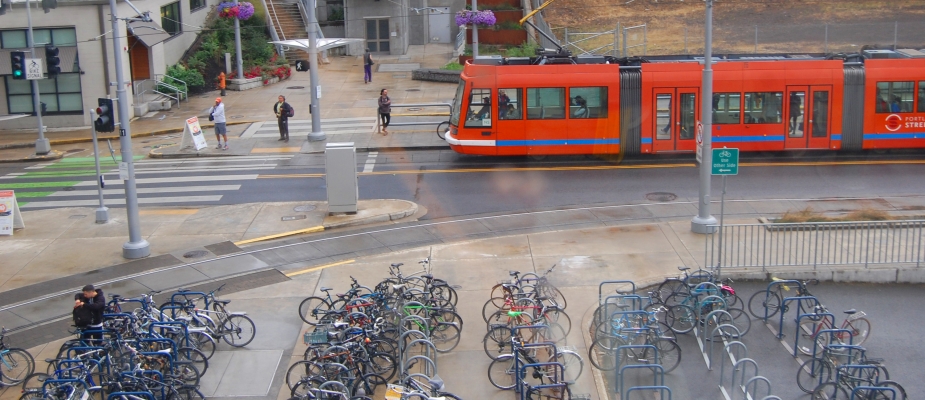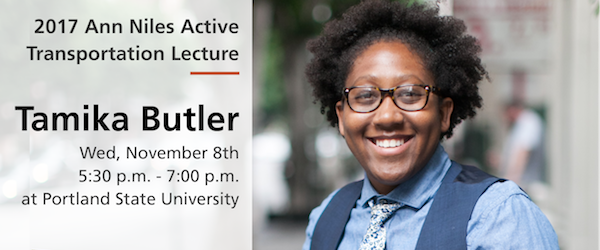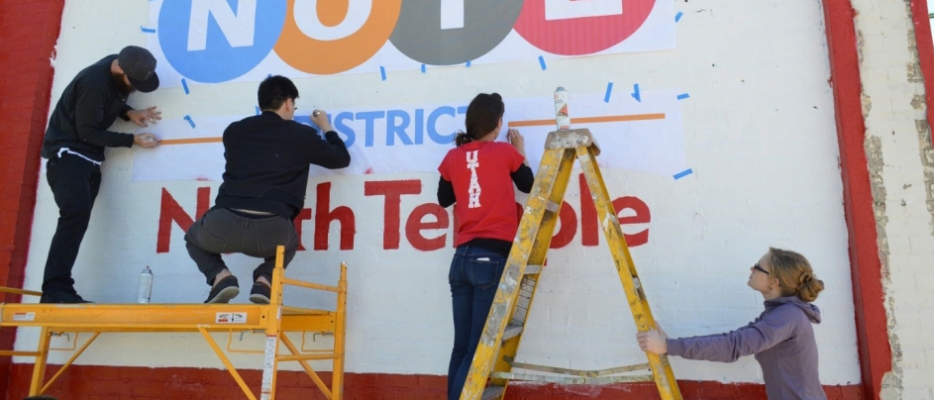This page serves as a homebase for our coverage of the 2018 Transportation Research Board (TRB) annual conference. Check back here for ongoing updates, as well as our Twitter and Facebook.
- NITC GUIDE TO TRB (print-friendly PDF): our printable schedule of where all of our NITC researchers will be presenting at lectures, poster sessions, and workshops
- NITC RECEPTION AT TRB: Join us for transportation bingo, co-hosted with TransitCenter, on Monday, January 8th (7–10:30pm) nearby at Fado Irish Pub
- NITC STUDENT AWARD AT CUTC BANQUET: We’ll be celebrating our 2017 NITC “Student of the Year”, Jordan Preston of Oregon Tech at the annual CUTC Banquet. She has been working as a graduate research assistant...
Jordan Preston, Oregon Institute of Technology (Oregon Tech)
Oregon Tech Student Profile | LinkedIn
An Update On Jordan at TRB:
NITC Student of the Year Jordan Preston attended TRB's annual meeting in 2018, and we had a conversation with her about the experience. Here are a few of her thoughts.
Do you have a funny story/enjoyable experience from TRB 2018 to share?
One of the highlights of my TRB experience was renting bikes with the rest of the Oregon Tech attendees and using the (awesome!) separated bike lanes to see a bit of Washington D.C. at night. Not only was I interested in actual bike lanes due to my various research projects, it was also just a great time with the professors and students to have a bit of fun!
At TRB 2018, which session(s) stood out/stuck with you the most?
I particularly enjoyed the poster sessions about bicycling, with content ranging from bike share usage to facility construction to parking shortages. Not only did I end up with an extensive list of articles and projects with more information than I can possibly sort through, it was also an excellent...
Read moreIn the last decade there has been a national trend toward projects that involve roadway space reallocation across modes. "Road Diets," in which one or more travel lanes are removed to make space for wider and safer bicycle and pedestrian space, is a common type of roadway reallocation.
A new NITC report by Miguel Figliozzi and Travis Glick of Portland State University offers a new methodology for doing before-and-after studies of these projects using high-resolution transit data. The data used in this project was supplied by TriMet, the transit provider for the Portland, Oregon metropolitan region.
Typically, before-and-after studies of roadway changes have used data on vehicle speeds to determine effects of change, without considering transit. By using datasets from transit providers, researchers can measure transit and also general traffic speed, so the data serve both purposes.
"This is a new methodology; something that no one...
Read moreNew laws in California and Oregon—California’s Sustainable Communities and Climate Protection Act (SB 375) and the Oregon Sustainable Transportation Initiative (SB 1059)—have made them the first states in the nation to try and reduce greenhouse gas (GHG) emissions using the transportation planning process.
A new NITC report coauthored by Keith Bartholomew and David Proffitt of the University of Utah evaluates how these pioneering laws have changed local planning processes in each state. Under these laws, metropolitan planning organizations (MPOs) must include climate goals in their regional transportation plans; coordinating land use and transportation infrastructure in a way that aims at reducing per capita GHG emissions.
"The MPOs have to show how, in the future, they could accomodate population growth, new housing and new...
Read moreTREC is searching for a transportation data program manager to administer our Portal Program.
The Portal Program Administrator will work on a variety of transportation data projects that require data synthesis, analysis, presentation and visualization.
This individual will work closely with the Transportation Research and Education Center (TREC), PORTAL (the Portland Region transportation data archive), and bike-ped data to develop requirements and recommendations on improving the usability of the Portland regional transportation, and bicycle and pedestrian data to help meet the needs of transportation agency end-users.
The PORTAL transportation data archive contains freeway (speed, count, travel time), arterial (travel time, traffic signal, bicycle count, pedestrian push button), transit, incident, weigh-in-motion and weather data. The BikePed Portal is the national archive for bicycle and pedestrian count data.
For more information and to apply, visit the Portland State University job posting or view the full...
Read moreOur National Institute for Transportation & Communities (NITC) research program has awarded grant funding for a new series of Small Starts projects.
Small Starts grants assist researchers who are interested in transportation but have not yet had an opportunity to undertake a small project—$15,000 in funding or less—that supports NITC's theme of safe, healthy and sustainable transportation choices to foster livable communities.
The latest projects selected by NITC's executive committee support that theme in exploring livable streets, multimodal safety and transportation efficiency.
The six newly funded projects are:
- Is There a "Buy Local" Case for Lower Travel Speeds? Testing Differences in Driver Recognition of Local Versus National Retail at Different Travel Speeds—Jonathan Bean and Arlie Adkins, University of Arizona (Full Proposal)
- How Will Autonomous Vehicles Change Local Government Budgeting and Finance? A Case Study of Solid Waste, Drop-off/Pick-up Zones, and Parking—Benjamin Clark, University of Oregon (...
Abolfazl Karimpour, Graduate Research Assistant in Engineering Mechanics at University of Arizona
Learn more about Abolfazl by following him on Facebook, or find his published articles on LinkedIn.
Tell us about yourself:
My name is Abolfazl, I born in Mashhad, Iran. I am a second year Ph.D. student in Department of Civil Engineering and Engineering Mechanics, The University of Arizona. My specialty is in Transportation Engineering, and I am working as a full time research assistant in the Smart Transportation Lab.
Why did you decide to attend University of Arizona?
I had the opportunity to continue my studies and enroll in the doctoral program in Iran, however it would not have provided me with the same learning opportunities as studying at the University of Arizona. Working and researching in UofA enabled me to advance my educational goals and make positive contributions to the field. My background in Transportation Engineering closely matches with what my colleagues are...
Read moreA new report from the University of Utah uses data to settle a debate that has been ongoing among transportation researchers since the 1990s: what are the effects of compact development on traffic congestion?
One camp argues that dense, compact development with a mixture of land uses will ultimately relieve congestion by encouraging fewer auto trips. On the opposite side, proponents of highway-induced, sprawling development argue that sprawl decreases congestion by funneling traffic away from dense areas, acting as a "traffic safety valve."
Led by Reid Ewing of the University of Utah and Shima Hamidi of the University of Texas at Arlington, this NITC study sought to address the question through cross sectional data. So which of these forms of urban development is better at reducing area-wide traffic congestion?
Surprisingly, neither.
Ewing and Hamidi arrived at the conclusion that development density—whether compact...
Read moreLivability encompasses several aspects of community, including safe, walkable neighborhoods; quality transit service and healthy green spaces. Making these types of benefits more available to underserved and marginalized populations is a key component of TREC's research focus. With the support of the Ann Niles Active Transportation Lecture Endowment, every year we host leaders who have made great strides in advocating for health, safety, and bicycle and pedestrian access.
For our 4th annual Ann Niles Lecture we've invited Tamika Butler – Executive Director of the Los Angeles Neighborhood Land Trust. In her current role she grows healthier, safer, and stronger communities through the creation of urban parks and community gardens—addressing the critical lack of green and recreational spaces in greater Los Angeles' underserved neighborhoods. Prior to this, Butler was the the executive director of the Los Angeles Bicycle Coalition, bringing energy and passion to the quest for better bicycle access.
Through our programs, including the Initiative for Bicycle and Pedestrian Innovation (IBPI) and...
Read moreStudents in the University of Utah’s Westside Studio investigated how to improve access to downtown from the west side of Salt Lake City.
Led by Ivis Garcia, the project's goal was to learn from residents about their use of an existing multi-use path, the Jordan Park River Trail, and to help enhance the connection between residents living near the trail and the downtown area on the river's east side.
Students surveyed 300 residents and conducted focus groups, which revealed that many area residents either didn't know about the trail or didn't perceive it as a safe place to walk. Local community leaders also visited the class and shared their expertise with students.
"A lot of elements of the course were around teaching community engagement and action," Garcia said.
In order to enhance users...
Read more
